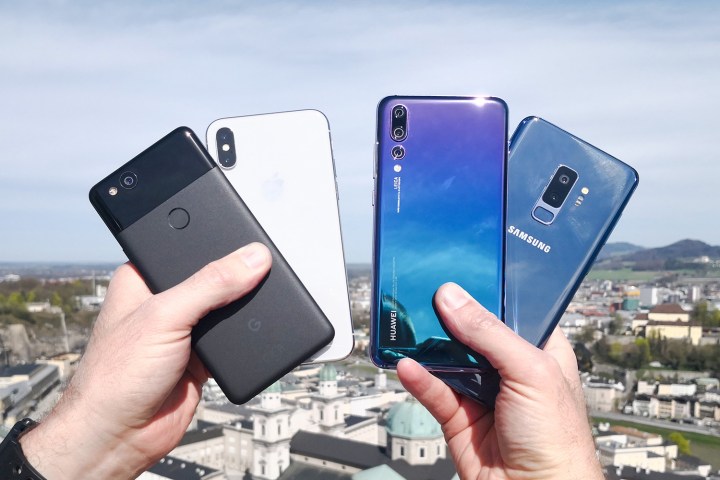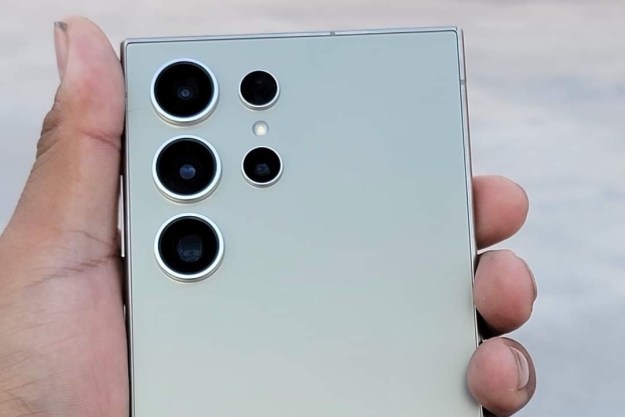
The Huawei P20 Pro has won praise, plaudits, and fans for its impressive triple-lens camera, but just how good is it compared to the other camera-phone powerhouses? On paper, it’s technically superior, and it has some truly unique features that make it stand out from the rest. Yet the Google Pixel 2, the Samsung Galaxy S9 Plus, and the Apple iPhone X are hardly lacking in the camera prowess department.
To find out, we pitted them all against each other in a photo shootout spanning the European countryside. Lass uns gehen!
The cameras
Let’s examine the camera specifications first, so each contender knows what it’s up against. First, the Huawei P20 Pro. It has three lenses: A 40-megapixel RGB lens with an f/1.8 aperture, a 20-megapixel monochrome lens with an f/1.6 aperture, and an 8-megapixel telephoto lens with an f/2.4 aperture. It’ll zoom in up to 3× without loss of quality, has electronic image stabilization, uses artificial intelligence for scene recognition and low-light photography enhancement, and captures 960 frames per second slow-motion video.
Basing everything purely on numbers, the Huawei P20 Pro has the rest of the pack beaten already; but numbers don’t tell the whole story.
The Samsung Galaxy S9 Plus has two camera lenses on the back, both with 12 megapixels, and a clever, mechanically adjusted aperture that swaps between f/1.5 and f/2.4. It has optical image stabilization, a 2× zoom without quality loss, and 960fps slow-motion video. The Google Pixel 2 is the only one of the four with a single camera lens, which has 12-megapixels and an f/1.8 aperture. That’s it, nothing special. It’s in the software that the Pixel 2 excels, providing beautiful HDR+ enhancements, and impressive bokeh-style portrait shots without a second
Finally, the Apple iPhone X has two camera lenses, both with 12 megapixels. One takes wide-angle photos with an f/1.8 aperture, and the second f/2.4 lens handles telephoto duties. It has optical image stabilization, 2× optical zoom without a loss in quality, and bokeh-style portrait pictures. Basing everything purely on numbers, the Huawei P20 Pro has the rest of the pack beaten already — but numbers don’t tell the whole story.
Fountains, and Frankfurt
The first picture shows us how closely matched these cameras are. We photographed a fountain outside the Steigenberger hotel in Frankfurt on a sunny but slightly overcast afternoon. Let’s go in reverse, eliminating the ones we like least straight away. It’s the Galaxy S9 Plus that takes the least realistically-colored photo; it’s overly bright, and the sky lacks the blue that other cameras revealed. The Huawei P20 Pro goes in the other direction, darkening the scene, particularly on the building.
- 1. Huawei P20 Pro
- 2. iPhone X
- 3. Galaxy S9
- 4. Pixel 2
That leaves the
Winner: Google Pixel 2
The Euro sign
The Euro sign is a well-known landmark in the center of Frankfurt’s financial district, and to capture the scene effectively, we shot our pictures in portrait orientation. The
- 1. Huawei P20 Pro
- 2. iPhone X
- 3. Galaxy S9
- 4. Pixel 2
The P20 Pro reveals detail when up close, a textured sky, and dark green grass; but the stars around the Euro sign are a little dark, and lack visual punch. The Pixel 2 and the Galaxy S9 take very similar pictures, with colors almost matching, and a similar level of detail. The Euro stars are bright, but it’s the Galaxy S9 that manages to best balance the blue of the sign with the gold of the stars, while maintaining the colors of the ground and the buildings.
Winner:
The bridge
Heading out into the German countryside, this picturesque bridge made us stop and take some photos, and the results couldn’t be more different. It’s the toughest call yet. One photo stands apart from the others, and it’s not technically the best image, but it’s the one that looks the most attractive to our eyes — the Galaxy S9 Plus. The grass on the right is wonderfully natural hue, the sky a baby blue, and the water reflective and cooling. If there’s a downside, it’s the slightly soft brickwork on the bridge that lacks a little detail.
- 1. Huawei P20 Pro
- 2. iPhone X
- 3. Galaxy S9
- 4. Pixel 2
The
Winner:
Church Spire
Let’s zoom. Each of these photos used the camera’s standard zoom feature, going to 2× or 3×. The Pixel 2 is the only one without a lossless zoom mode, and it really shows when you get in close, consequently eliminating the phone from the running at the first hurdle. Surprisingly, the
- 1. Huawei P20 Pro
- 2. iPhone X
- 3. Galaxy S9
- 4. Pixel 2
Both of these phones took fantastic zoomed-in images, but the P20 Pro takes first place here. The sharpness and detail is quite astonishing, easily getting in much closer than any of the other phones. While other categories have not revealed an instantly clear winner, this is the first time it has been obvious from the outset.
Winner: Huawei P20 Pro
Night-time cafe
Moving to Austria and Salzburg, we snapped this lively town square cafe set beside an imposing cliff face. It had everything: Color, drama, movement, and challenging lighting conditions. The
- 1. Huawei P20 Pro
- 2. iPhone X
- 3. Galaxy S9
- 4. Pixel 2
We love the way the Galaxy S9 captures the varied lighting under the cafe canopy, giving the shot a realistic edge, but its the P20 Pro that wins with some stunning detail. Just take a look at the texture on the road, and the brickwork under the pink lighting on the building, the yellow “Moving Pictures” sign, and then the cliff face itself. It’s very impressive.
Winner: Huawei P20 Pro
Darkness
The ultimate test? Walking past a dark entrance to a house, recessed from the road enough that you could barely make out anything there with the naked eye. The Pixel 2’s picture is brighter than what we could really see, and representative of what we’d expect a smartphone to achieve given the conditions. The
- 1. Huawei P20 Pro
- 2. iPhone X
- 3. Galaxy S9
- 4. Pixel 2
The Galaxy S9 Plus is leaps and bounds ahead, showing the building itself, making the white sign readable, and revealing there’s a car hidden on the left-hand side. The color is off and details are blurred, however, particularly the trees overhanging the car and the left of the picture.
You may think we wheeled out a massive spotlight for the P20 Pro’s picture, or that a security light flicked on; but we assure you, it was taken under exactly the same conditions. You can see the gravel driveway, the wall on the right, and the shape and texture of the trees on the left, and you can even establish what brand of car is hiding. There are two trees in the center of the picture that are almost completely obscured in the other images, even the Galaxy S9 Plus’ photo.
Winner: Huawei P20 Pro
Blue sky
The P20 Pro uses artificial intelligence (AI) to adjust the camera settings depending on the scene. In this photo it switched to Blue Sky mode. It’s proof that Huawei’s decision to let you turn off the AI enhancements is a good one, because while the sky is a wonderful blue, it’s at the expense of detail in the lower half of the picture. The Galaxy S9 Plus also suffers from an overly blue sky and a lack of detail, especially on the wall in the right of the picture.
- 1. Huawei P20 Pro
- 2. iPhone X
- 3. Galaxy S9
- 4. Pixel 2
This leaves the
Winner:
Portrait telescope
All four phones have a portrait mode, producing the effect of an object in the foreground isolated against a blurred background. We chose a very shiny telescope on top of the Hohensalzburg Castle as our subject. No post-image alterations were made to the focal point, which is possible on the P20 Pro and the Galaxy S9 Plus.
- 1. Huawei P20 Pro
- 2. iPhone X
- 3. Galaxy S9
- 4. Pixel 2
The Pixel 2 isn’t a contender here, as it didn’t manage to blur out the background at all, despite taking a pleasant picture and telling us the portrait mode was active. It’s the only camera that relies on software to manipulate the image, rather than a combination of two or more lenses. The Galaxy S9 Plus and the
Neither camera allowed us to step back from the scene and retain the portrait mode like the P20 Pro. Using its Aperture mode, we could still isolate the telescope against a much more expansive background, creating a very different type of picture. We prefer this because if we want to make the telescope the focal point, it’s easy to crop the picture down. With the S9 Plus and the
Winner: Huawei P20 Pro
The black forest gateaux
Finally, back in London, we visited one of the original Patisserie Valerie cafes in the city, to enjoy tea and a piece of black forest gateaux. Food is rarely snapped in ideal conditions, and the cafe on Old Compton Street is no exception. Dark wood cladding and low lighting make it challenging for phones to get colors and contrast right. Each phone varied a lot here.
- 1. Huawei P20 Pro
- 2. iPhone X
- 3. Galaxy S9
- 4. Pixel 2
The four phones are split into two, with the Huawei P20 Pro and the Pixel 2 taking pictures we liked the least, and the Galaxy S9 and the
Look at the Galaxy S9’s picture, and the detail is better again in the darker areas, but the
Winner:
Conclusion
The Pixel 2 won a single category, but was a runner-up in two further categories, showing just how great it performs with a single-lens camera. No-one is going to be disappointed with the results from a Pixel 2. The Apple iPhone X took two category wins, and a single runner-up prize. It’s notable that its wins were everyday situations in which we all take photos — blue skies, the countryside, and food. You’ll be happy with its performance in most situations.
The Huawei P20 Pro won four categories, all of which really highlight the camera’s strengths.
The Galaxy S9 Plus also took two wins, but it snapped against the P20 Pro’s heels in four other categories, and it was often a tough decision splitting the two. It’s genuinely superb, as we’ve seen in other comparisons, and there’s almost no situation where it won’t take a fantastic photograph.
That leaves the Huawei P20 Pro, which won four categories, all of which really highlight the camera’s strengths — zoom, low light, and portrait — and accentuate just how far ahead of other cameras it is in these departments. Does this mean it’s the big winner here, and should be purchased over the others? That’s a harder question to answer. The Galaxy S9 Plus is arguably the more capable, everyday-use camera phone, but it does lack the P20 Pro’s superb feature set and enviable monochrome mode.
In reality, all four of these phones are excellent. Do note, you can’t buy the Huawei P20 Pro in the U.S. unless you import it.
Editors' Recommendations
- 5 phones you should buy instead of the iPhone 15 Pro Max
- Why I ditched my iPhone 15 Pro for the Samsung Galaxy S24 Ultra
- Don’t buy a Galaxy S24 Ultra or iPhone 15 Pro Max. Do this instead
- I want the iPhone 16 to steal these 6 Galaxy S24 features
- The Galaxy S24 Ultra beats the iPhone in the worst way possible







































